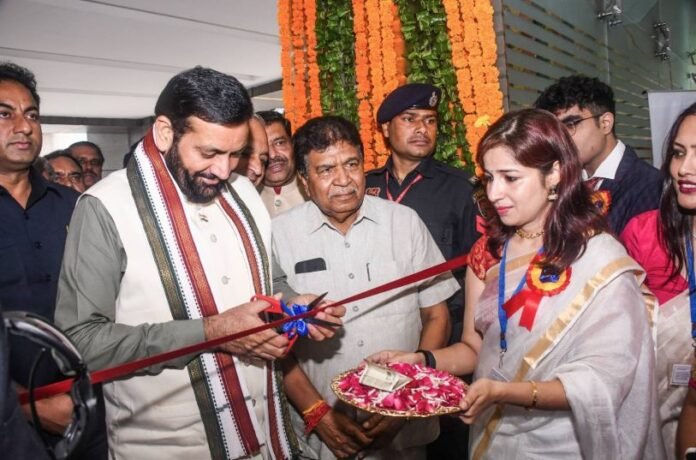Haryana CM Nayab Singh Saini announces city-wise cleanliness rankings on the lines of Swachh Survekshan, launches Swachhta Pakhwada from September 17 to October 2, and directs officials to work as “Team Haryana” for a cleaner, healthier state.
Haryana Chief Minister Nayab Singh Saini has announced that the state will soon introduce a city-wise cleanliness ranking system modeled on the Centre’s Swachh Survekshan to encourage a competitive spirit among cities and promote sustainable urban hygiene practices. The initiative aims to recognize and reward towns and cities that deliver outstanding performance in sanitation, urban waste management, and public health.
Speaking at a high-level review meeting with senior officers of the Urban Local Bodies, Health Department, and district administrations after inaugurating the newly built Haryana Financial Management Institute in Panchkula, the Chief Minister emphasized the need for collective efforts under the banner of “Team Haryana.” He underlined that officials must take ownership in building a progressive state that is clean, beautiful, and healthy for future generations. Deputy Commissioners from all districts participated in the meeting through video conferencing, while senior cabinet ministers including Urban Local Bodies Minister Vipul Goel, PWD Minister Ranbir Gangwa, and Health and Family Welfare Minister Aarti Singh Rao were present.
CM Saini noted that Prime Minister Narendra Modi has set the vision of making India a developed nation by 2047 and stressed that cleanliness is one of the building blocks of this mission. He recalled how the “Swachh Bharat, Swasth Bharat” campaign launched in 2014 underlined the transformative role of sanitation in shaping the country’s social fabric and inspiring even children to adopt cleanliness as a way of life. The Chief Minister said it is the collective responsibility of citizens, officials, and community groups to ensure that their surroundings remain clean and that the culture of hygiene is sustained across towns and villages.
As part of the campaign, the state will observe Swachhta Pakhwada (Cleanliness Fortnight) from September 17 to October 2, coinciding with Prime Minister Modi’s birthday and Gandhi Jayanti, to intensify public participation in sanitation drives. During this period, a wide range of awareness programs, public outreach initiatives, and community clean-up activities will be organized across Haryana. The Chief Minister directed municipal commissioners to resolve even the smallest sanitation complaints from citizens promptly to enhance public confidence in the government. He also urged Resident Welfare Associations (RWAs) and voluntary organizations to be integrated into the campaign. Furthermore, he asked corporations and industries to utilize CSR funds for beautification of public spaces, including traffic roundabouts, to improve urban aesthetics.
Taking serious note of the problem of stray cattle on the streets, CM Saini instructed that no abandoned animal should be seen roaming on state roads. He ordered that any stray cattle spotted must be immediately shifted to designated gaushalas (cow shelters). Highlighting budgetary provisions, he stated that the government has significantly increased funding for the construction and maintenance of gaushalas to address this issue permanently.
Expanding the focus to basic services, the Chief Minister reiterated that the government is committed to improving access to electricity, water, education, healthcare, and sanitation with speed and efficiency. The goal, he said, is to simplify the daily lives of citizens and introduce positive change in governance through transparency and accountability. He called on officers to work with complete dedication, honesty, and team spirit in delivering these essential services.
On the healthcare front, CM Saini underscored that doctors are viewed as equivalent to gods for patients and urged all medical staff to treat each patient with empathy, patience, and respect. He outlined the government’s vision of providing facilities in public hospitals that rival private healthcare, thereby eliminating the need for citizens to spend heavily in private institutions. District hospitals across Haryana are being equipped with advanced diagnostic infrastructure, including CT scans, MRI machines, digital X-ray facilities, ultrasound systems, and modern testing laboratories.
Urban Local Bodies Minister Vipul Goel, in his address, noted that under the Chief Minister’s leadership, drainage arrangements during the current monsoon season had shown marked improvement compared to previous years. He credited the performance of the ULB officials and announced that a state-wide 11-week cleanliness campaign would commence on August 24, targeting urban infrastructure such as government buildings, streets, hospitals, and public establishments.
Health Minister Aarti Singh Rao added that the Chief Minister’s priority is to ensure that public hospitals offer superior facilities compared to private counterparts. She revealed that renovation, modernization, and beautification works are being carried out across civil hospitals to create a better environment for patients.
The meeting was also attended by Chief Secretary Anurag Rastogi, Additional Chief Secretary (Health) Sudhir Rajpal, Principal Secretary to CM Arun Gupta, Commissioner and Secretary of Urban Local Bodies Department Vikas Gupta, and Director General of Information, Public Relations & Languages Department K.M. Pandurang, among other senior officers.
By adopting a city-wise cleanliness ranking and aligning it with public health and civic engagement, the Haryana government aims to drive both grassroots participation and administrative accountability. The initiative not only echoes the national mission but also positions Haryana as a state determined to achieve global benchmarks in cleanliness and sustainable urban development.
This is a web-generated news report.




